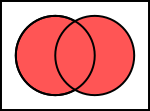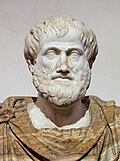An interpretation is an assignment of meaning to the symbols of a formal language. Many formal languages used in mathematics, logic, and theoretical computer... 32 KB (4,421 words) - 20:08, 14 February 2024 |
structure Interpretation function, in mathematical logic a function that assigns functions and relations to the symbols of a signature Interpretations of quantum... 4 KB (457 words) - 19:37, 28 July 2023 |
First-order logic—also known as predicate logic, quantificational logic, and first-order predicate calculus—is a collection of formal systems used in... 93 KB (13,173 words) - 20:30, 24 April 2024 |
as "interpretations", whereas the term "interpretation" generally has a different (although related) meaning in model theory, see interpretation (model... 34 KB (5,097 words) - 17:45, 30 March 2024 |
In mathematical logic, a tautology (from Greek: ταυτολογία) is a formula or assertion that is true in every possible interpretation. An example is "x=y... 21 KB (2,970 words) - 09:11, 29 March 2024 |
depending on the interpretation given to them. While first-order logic only includes predicates that apply to individual constants, other logics may allow predicates... 4 KB (416 words) - 16:12, 26 February 2024 |
classical logic. The standard explanation of intuitionistic logic is the BHK interpretation. Several systems of semantics for intuitionistic logic have been... 50 KB (7,619 words) - 10:28, 29 April 2024 |
Propositional calculus (redirect from Sentential logic) branch of logic. It is also called propositional logic, statement logic, sentential calculus, sentential logic, or sometimes zeroth-order logic. It deals... 138 KB (15,652 words) - 09:41, 28 April 2024 |
if and only if it is true under every possible interpretation of the language. In propositional logic, they are tautologies. A statement can be called... 9 KB (975 words) - 06:49, 21 March 2024 |
of simple denotational models, linear logic may be seen as refining the interpretation of intuitionistic logic by replacing cartesian (closed) categories... 33 KB (2,890 words) - 21:51, 19 April 2024 |
Curry–Howard correspondence (redirect from Proofs-as-programs interpretation) between logic and computation that is usually attributed to Curry and Howard, although the idea is related to the operational interpretation of intuitionistic... 57 KB (6,197 words) - 22:44, 18 March 2024 |
 | In logic, syntax is anything having to do with formal languages or formal systems without regard to any interpretation or meaning given to them. Syntax... 10 KB (1,004 words) - 15:12, 23 March 2024 |
In logic, the semantics of logic or formal semantics is the study of the semantics, or interpretations, of formal languages and (idealizations of) natural... 5 KB (574 words) - 15:20, 23 March 2024 |
constitutional documents and legislation (see statutory interpretation). In logic, an interpretation is an assignment of meaning to the symbols of a language... 4 KB (413 words) - 03:11, 30 March 2024 |
Classical logic Computability logic Deontic logic Dependence logic Description logic Deviant logic Doxastic logic Epistemic logic First-order logic Formal... 24 KB (2,084 words) - 19:35, 14 March 2024 |
 | Logical disjunction (redirect from Or (logic)) In logic, disjunction, also known as logical disjunction or logical or or logical addition or inclusive disjunction, is a logical connective typically... 16 KB (1,848 words) - 16:25, 15 April 2024 |
In mathematical logic, the Brouwer–Heyting–Kolmogorov interpretation, or BHK interpretation, of intuitionistic logic was proposed by L. E. J. Brouwer and... 8 KB (1,279 words) - 01:26, 3 March 2024 |
Well-formed formula (redirect from Formula (mathematical logic)) of an interpretation. Two key uses of formulas are in propositional logic and predicate logic. A key use of formulas is in propositional logic and predicate... 16 KB (1,971 words) - 17:54, 14 April 2024 |
Philosophy of logic is the area of philosophy that studies the scope and nature of logic. It investigates the philosophical problems raised by logic, such as... 96 KB (11,673 words) - 08:57, 15 April 2024 |
collapse, but he later abandoned this interpretation. Quantum logic can be regarded as a kind of propositional logic suitable for understanding the apparent... 69 KB (7,950 words) - 03:58, 1 April 2024 |
(mathematical logic) Interpretation (logic) Substructure (mathematics) Elementary substructure Skolem hull Non-standard model Atomic model (mathematical logic) Prime... 14 KB (1,012 words) - 19:53, 12 November 2023 |
Common Logic (CL) is a framework for a family of logic languages, based on first-order logic, intended to facilitate the exchange and transmission of... 4 KB (456 words) - 04:48, 4 February 2024 |
formulas with those variables. In first-order logic and higher-order logics, a structure, (the interpretation) and the corresponding assignment of a truth... 3 KB (355 words) - 12:40, 27 October 2019 |
Interpretability (redirect from Relative interpretation) in 1992–93. Interpretation (logic) Interpretation (model theory) Interpretability logic Japaridze, G., and De Jongh, D. (1998) "The logic of provability"... 1 KB (169 words) - 14:33, 7 January 2024 |
 | Domain of discourse (category Predicate logic) discourse of a formalization of the science. For example, in an interpretation of first-order logic, the domain of discourse is the set of individuals over which... 4 KB (571 words) - 14:55, 7 November 2023 |
Rule of inference (redirect from Laws of Logic) classical logic (as well as the semantics of many other non-classical logics), in the sense that if the premises are true (under an interpretation), then... 11 KB (1,469 words) - 09:38, 23 October 2023 |
 | Organon (redirect from Aristotle's logic) Aristotle's followers, the Peripatetics, who maintained against the Stoics that Logic was "an instrument" of Philosophy. Aristotle never uses the title Organon... 16 KB (1,645 words) - 15:53, 21 February 2024 |
In logic, a quantifier is an operator that specifies how many individuals in the domain of discourse satisfy an open formula. For instance, the universal... 32 KB (4,565 words) - 23:32, 29 April 2024 |
In logic and mathematics, second-order logic is an extension of first-order logic, which itself is an extension of propositional logic. Second-order logic... 31 KB (4,321 words) - 11:40, 19 February 2024 |

